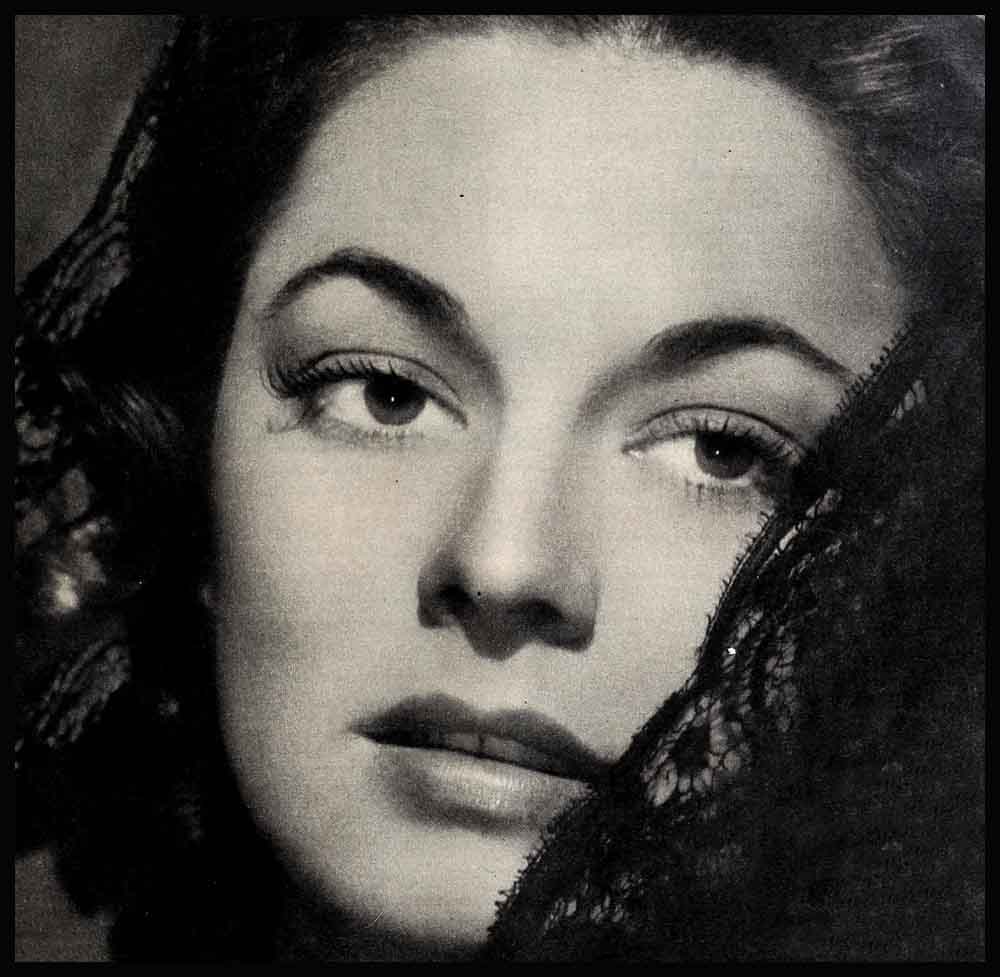
The Life Story Of Ruth Roman
It was a year ago this January that Jack Warner announced Ruth Roman had been made a star. But she wants to be more than just a star. She wants to be a great actress. “I still have so much to learn,” she confides with genuine humility, “but one thing I do know. If I never do anything else from here on in, I have the satisfaction of knowing I did exactly what I set out to do when I came out here—to stay until I proved myself, no matter how tough it got to be.” The most incredible part of all this was that Ruth herself was practically the last person in the studio to learn the news of her star status.
She walked into the commissary that day for coffee, attired in a pair of shabby blue jeans, her costume for her role in “Colt 45,” and she was startled to see the entire table of writers rise in a body and salute her.
Now the writers, as Ruth well knew, seldom get up for anything. They aren’t table- hoppers and they are usually too absorbed in conversation to notice who comes or goes.
“Have you boys gone crazy or something?” she asked delicately. But she didn’t get a straight answer until minutes later when they were finally convinced she actually didn’t know that she’d just been promoted to stardom.
And then she thought they were teasing until someone thrust a copy of the Reporter, a Hollywood trade paper, under her nose and showed her the announcement.
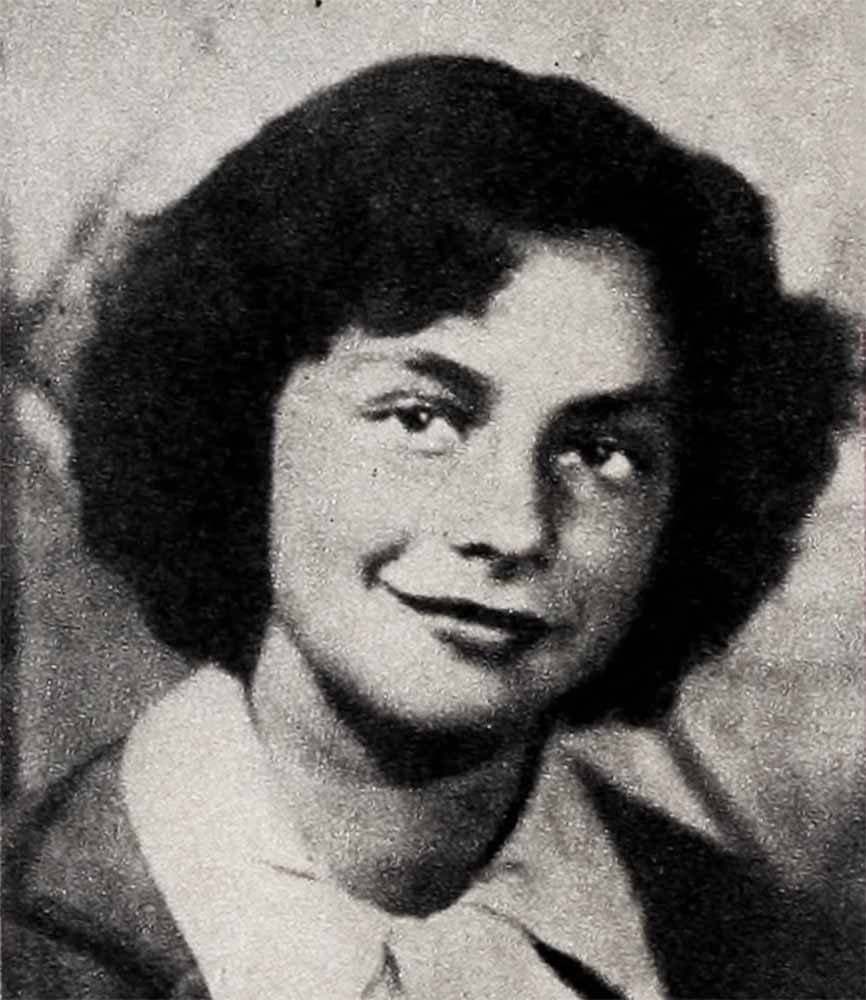
“It’s strange,” she said afterward, “how you dream about how great it will feel when you finally get on top, all the things you’ll do, yet when it happens you’re so involved with new problems, new struggles, that you don’t have the time or the energy to wallow in your success.”
It isn’t likely that Ruth will ever find time to “wallow.” She’s a regular dynamo. The wonderful vitality that gives her acting such impact is one of her most outstanding characteristics.
“If you go to the beach with her,” Janet Stewart, an ex-roommate, explains, “you can’t just lie there in the sun. You have to run up and down the beach, or, if you walk, you have to read Shakespeare at the same time. Out loud, of course.”
It is well known she plays a fierce game of tennis. Usually her opponents are clinging to the net for support when she is just hitting her stride. And even if she’s losing the game, she puts up a fight that is almost appalling in its intensity.
“Brother, can that gal take a beating,” one victorious opponent exclaimed in admiration.
In those days before she got her break in Hollywood, she probably took a lot more of a beating than anyone else around, because she would never give in. She wanted too hard and cared too much. “I was stubborn,” she explains.
But it wasn’t just stubbornness that carried her along. It wasn’t even her ability, which was exceptional from the first. It was her incredibly sharp insight into her own emotions.
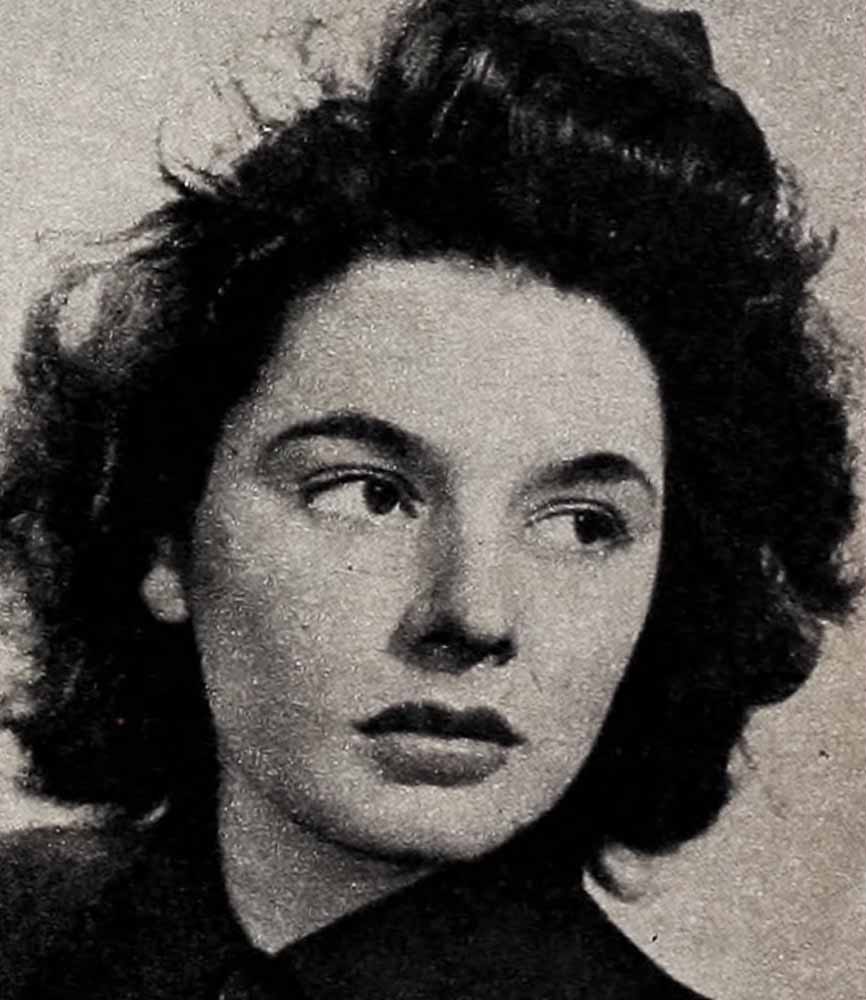
“I realized one day a long time ago that the toughest obstacle to overcome was me. I could take care of the outside things. It was the inside I had to control. If I can beat myself, I decided, I can beat anything.”
Understanding that made quite a difference to Ruth. She learned how to judge herself, her situations, her companions with honesty and fairness. She has never blamed the world for her bad breaks, and if she has a tantrum, she knows it exactly for what it is. “Naturally, I would prefer to think I am having a majestic tragedy, but that’s ‘hamming it up’ and I know it.”
Her mother was the first person to teach Ruth about self-control. Mrs. Roman didn’t believe in crying over pain. She said it was just self-pity.
Early Roman history really began in Boston, where Ruth and her two older sisters, Ann and Eve, were born. Papa was the owner of a carnival sideshow. “It wasn’t a very big one or a very fancy one,” Ruth recalls, “but it was the most exciting thing in the world to me. I would hang around it hour after hour. I even hated to take the time to go home to lunch. I still get weak with nostalgia whenever I look at a merry-go-round.”
Papa spieled the show, ran the business. Mama, who for reasons nobody remembers was dubbed “Suki” by the family, did everything else. It was terribly hard work for just two people, but there wasn’t enough in come to hire help. Suki never complained even though she had three small children and the household tasks to take care of as well.
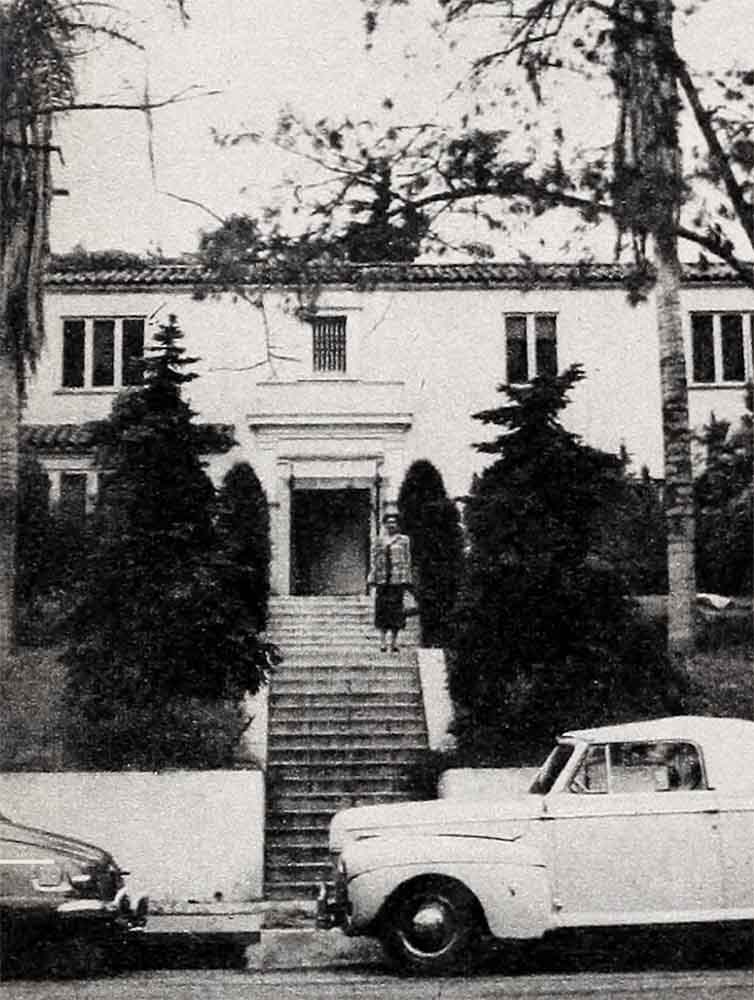
“She had show business in her blood, too,” Ruth explains proudly whenever she talks about her mother. “She was a wonderful dancer, and if she’d been given a chance she would have become a great one.”
But there was no chance for Suki. Because Papa died before Ruth was even old enough to go to school, before the carnival had even begun to pay off those years of back-breaking devotion.
Suki couldn’t run the show alone. The intricacies of business and finance were beyond her small power to add or subtract.
“Figuring up a grocery bill was about as much as she could handle,” Ruth admits with amusement. Suki sold the show shortly after her husband’s death. It was the only thing she could do. There was no money in the bank, and a family that had to be fed every day. She didn’t dare to gamble their safety against the uncertain future of a relatively obscure carnival outfit.
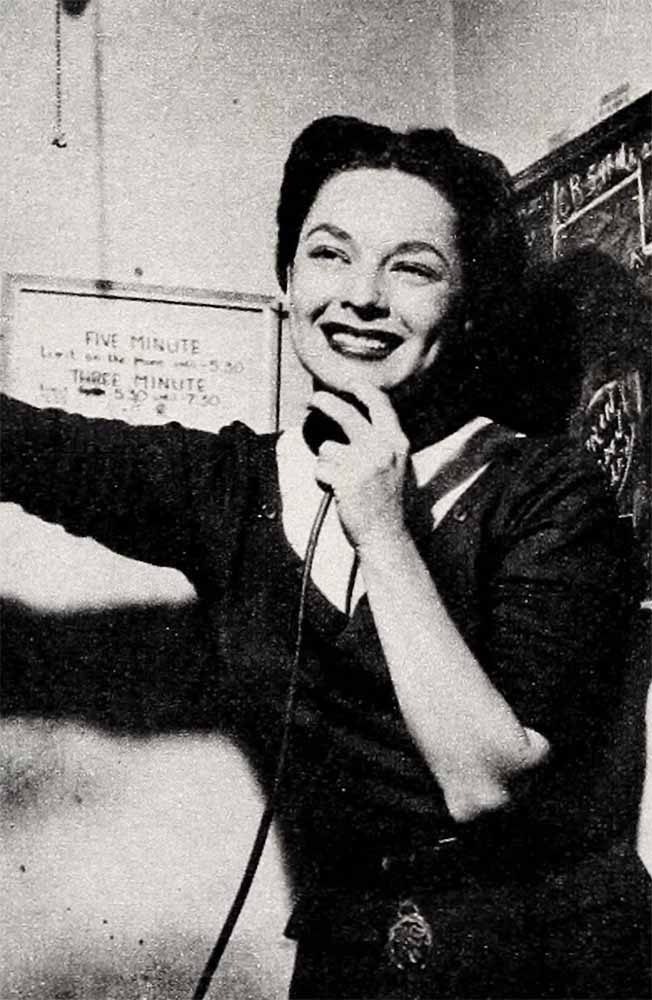
“The ironic part of it all,” Ruth explains sadly to her friends, “is that the people who bought us out are now millionaires.”
They were always poor. Not until Ruth got her break in the movies were the Romans able to move out of that noisy tenement section of West Boston.
The kids around that neighborhood were tough. “You had to be on your toes every minute.” Ruth remembers, “You couldn’t let them see you were scared or they’d torment the life out of you.”
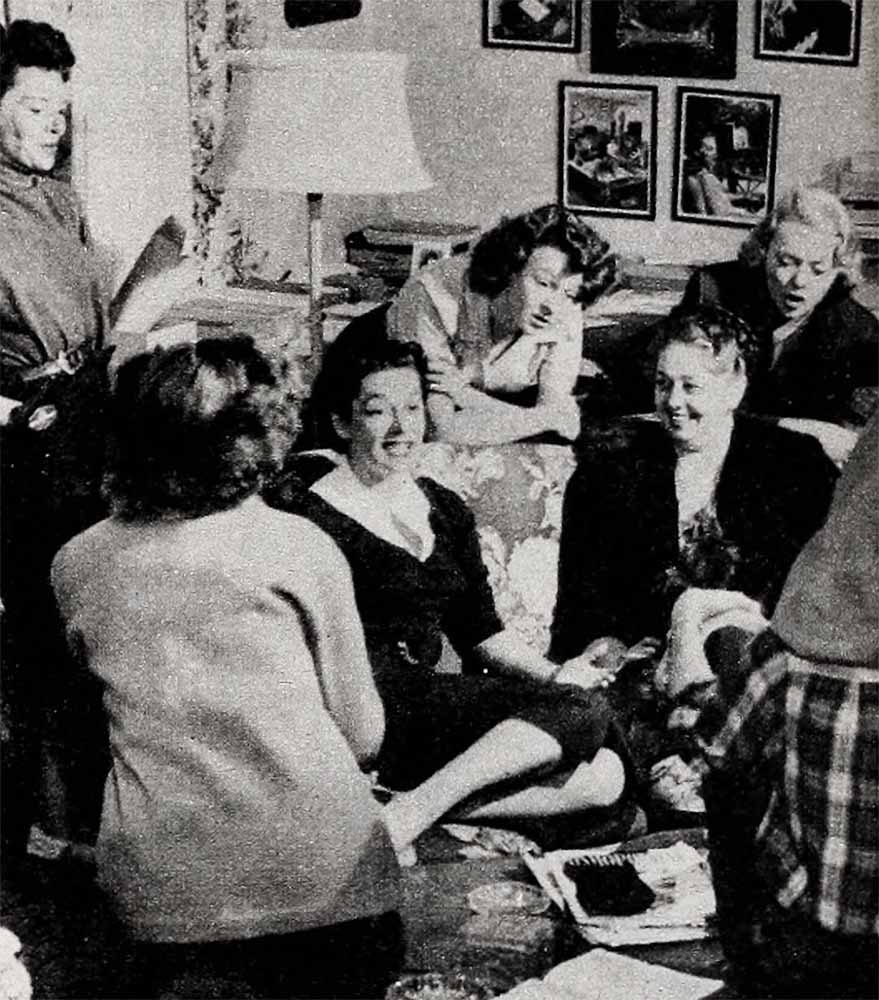
So Ruthie got tough, too. She took as good as they gave. She wore pants, played their games, and wasn’t above trading punches with some of the boys when they got smart.
This kind of basic training was responsible for an amusing incident when Ruth was working in “The Window.”
The cast had come to New York to shoot some of the scenes. The locale, selected for its authenticity, was up around 185th Street. The very first morning of shooting, the entire crew became a target for abuse by the leading hoodlums of the area.
“Yah, Yah,” someone shouted. “Lookit ’em big-shot movee stahs. Makin’ a pitcha to put inna movees.”
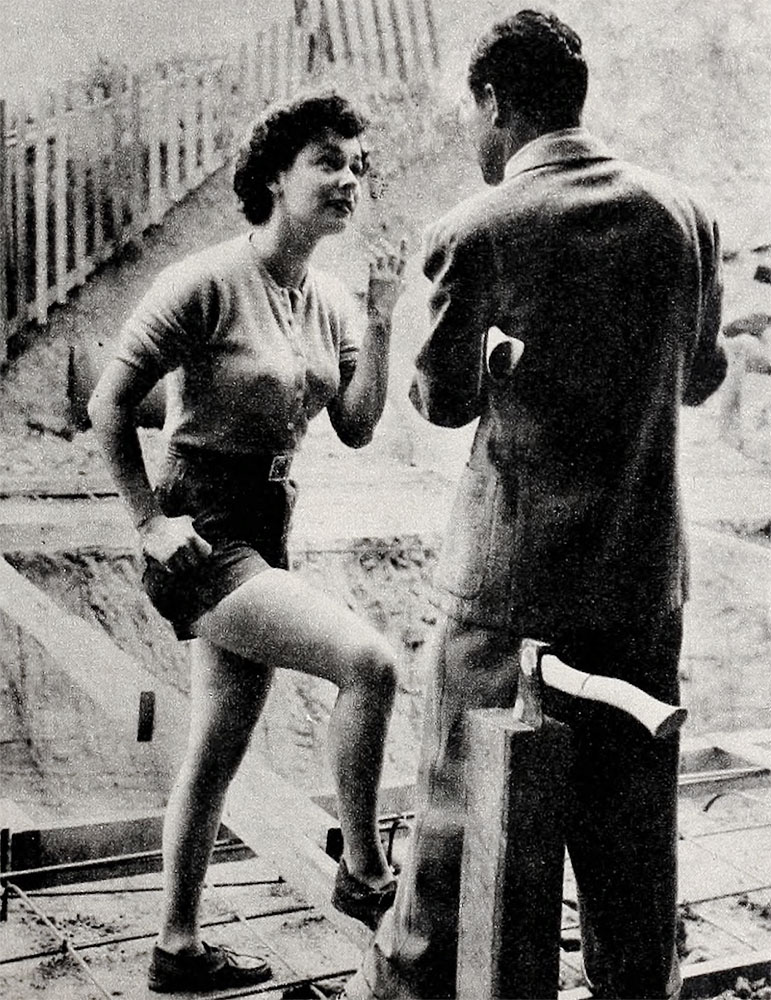
It became obvious to everyone that if this kind of heckling continued, they would have to stop work. No one knew quite how to handle the situation and then, suddenly, Ruth started toward the bunch of young hostiles with grim fury. They grew silent as she came toward them, and when she began to lambast them in their own native idiom they could only gape in astonishment and slink away.
“That was the funniest thing,” she said later. “I did it without even thinking. I guess for those few moments, I was back in Boston.”
Not all of Ruth’s days in Boston were spent in the street, however. There was dignity if not luxury in the Roman house-hold. Even though Suki had to resort to tedious, menial jobs like dishwashing or taking in laundry to keep them going, she found time to stimulate their interest in books and music. Especially ballet music. It was all of dancing Suki could still have.

From the start, Ruth’s main interest was acting. As a child, she was terribly emotional. She resented the poverty and the eternal struggle for bare necessities. Even more than her sisters, she sensed the growing weariness of her mother, and it made her feel guilty. Most of this she was too young to understand, of course, but the feelings were just as sharp and just as painful.
The only thing that made it bearable was her escape into fantasy, and she had an incredible imagination. It is no surprise that Ruth found the whole idea of theater a fascinating one.
Her first activity in this field began when she started acting in children’s plays at the community settlement house. When Ruth saw a sign outside the door which said, “Play Acting,” that was all she needed. They produced little one-act plays like “Bridget and the Fairies.”
After that when she wasn’t acting she was reading about it. She read every book on drama she could absorb, even though a lot of it went over her head then.
“I’m still the same way,” she admits. “I guess I love acting so much I can’t bear not to be involved with it.”
Perseverance landed her her first grown-up role with a group of semi-professional players when she was thirteen.
She had learned that the group under the direction of Robert Delaney was preparing to cast for “Excursion.”
She managed to see Delaney one afternoon at the theater and asked for a chance to read for the part of Lollie.
Delaney was annoyed. “My dear girl,” he told her, “the part calls for a young girl of eighteen . . . practically a woman . . . you’re too young for that.”
“Try me,” begged Ruth. “Just let me read it once for you. Just once, that’s all.”
Even an experienced director like Delaney couldn’t hold out against such dogged passion. He told her to appear the following Sunday and read.

On Sunday, Ruth arrived before anyone else, a little pale, but sure of her ground. Delaney sat impassively in the audience with the rest of the cast. Ruth could see the older girls in the back were being amused by the whole thing. It distressed her for a moment, but she forgot them as she began to read. Her voice rang through the theater and as the words leaped to life Lottie emerged with gripping reality before an astonished audience. The girls in the back had stopped giggling.
“It wasn’t so much that I was a good actress then, because I wasn’t. But Lottie was me. Her anger and loneliness were things I knew too well. That’s why those lines rang true when I read them.”
Needless to say, she got the part.
The kids in the neighborhood were making things tough again. They didn’t understand her devotion to the theater. When she stopped playing with them, and hung around with her fellow actors instead, they decided she’d gone high-hat. “Miss Stuck-Up” they called her and made fun of the poised way she was learning to walk. One of these days, she told herself, she’d show them. She’d go to New York, and become a famous actress. At that point, she naively assumed she would become a success the minute she arrived.
“But it wasn’t like that,” she recalls grimly. “New York was real frustration for me. It still makes me shudder. Most people don’t know how many heartbreaking years there are behind a success in this business. All they can see is that you’re a star with your name in lights. Some kind of magic put you there.”
It wasn’t magic that wafted Ruth Roman to stardom. It wasn’t a lucky coincidence, or knowing the right contact. It wasn’t anything like this. It was sheer, unadulterated concentration, her ability to keep focused on her one deepset ambition.
There were times when she wavered a little. When she was fifteen, she was awarded a three-year scholarship to the Bishop Lee Dramatic School. It was strictly Junior League, but Ruth’s exceptional talent kept others envying her instead of vice versa. “Imagine,” she relates today with some astonishment. “Imagine those girls with their cashmere sweaters and shiny convertibles sitting there and wishing they were me. It’s incredible. But they did. They used to tell me so.”
At any rate, Ruth was just finishing up her first year there when she realized that the graduating seniors would be shipped to New York for their Broadway trials.
She decided she’d had enough schooling; what she needed was real professional experience, so she packed her battered suitcase with a few threadbare belongings, ten dollars she’d carefully saved from after-school jobs—and went off to conquer New York. If her mother thought she was crazy, she didn’t say so. She quietly packed Ruth a lunch and kissed her goodbye.
“It was absolutely the dankest, darkest, rainiest night in the history of New York when I arrived,” Ruth insists. Her raincoat was thin and so worn the water soaked right through. She was getting horribly depressed and somewhat frightened. The only place she could think of to stay was the YWCA. It was a nice, safe place.
In the morning it was worse. She couldn’t bring herself to go out. She just sat in her room and cried, and finally that night, she took a train back to Boston.
“I don’t know what got into me,” Ruth confesses whenever the subject of this painful first flight comes up. “I must have been suffering from an acute case of ego. I thought I was as good as the seniors, in spite of the fact they had more training. But I guess part of me knew I wasn’t. That’s the part that paralyzed me when I reached New York.”
When she returned to Boston, her mother made no comment. Ruth herself was silent for days, which was an extraordinary feat for a girl whose emotions were conveyed largely by sound.
Some time later, Suki made a quiet reference to her daughter’s venture. “You can’t build a house without a foundation.”
Ruth knew she was right. She decided that the most important thing she could do to insure her future as an actress, was to learn everything there was about acting. She would study until she was blue in the face. Then she’d think about New York.
During the vacation months, Ruth joined summer stock groups. It was fine experience and by the time she was seventeen, she felt she was ready for New York.
She had saved enough money to keep her going for a few months. By that time, she’d surely have landed a part in a show.
She packed her suitcase again, this time for real, and headed for New York.
It wasn’t much better than before. She did do a few things. She had a bit in “Junior Miss” for a while, a walk-on part in some turkey that lasted one performance; and once she shouted “hooray” in a crowd scene. To say nothing of the week she became an understudy and lived in the wings.
“I was magnificent,” she told her friends, years later. “They never forgot me. In fact, they never even saw me.”
There was not even a real romantic interest to soften the loneliness of frustration.
Men had never played a very important part in Ruth’s emotional life. She had always figured that someday there would be a man, and children, but first she wanted to find her niche as an actress.
“I used to fall in love,” she will admit if you ask about the men in her life. “Madly. For twenty minutes each time.”
There was nothing serious except once, while she was still in the East. She decided she was in love with a young man, married him without the slightest conception of what a real marriage involved. It lasted but a few months and both of them realized what a mistake it had been.
Ruth seldom speaks of it and prefers to forget the unhappiness it brought.
When Ruth’s money was gone she had to look for work outside the theater. She took all kinds of jobs. She modeled, she addressed envelopes, she waited on tables. She even posed for pictures for crime magazine illustrations. She once described to Hedda Hopper a check she received from one magazine. On the back where the check had to be endorsed was the title of the story that went with the picture. It read “I’m Sorry I Killed You, Darling” and it was signed “Ruth Roman.”
During her last year in New York, Ruth was fortunate in having a roommate who had an allowance from home. “She was wonderful to me,” Ruth exclaims. “Whenever she had a date for dinner, she would ask me to come along. The young men couldn’t refuse to have me. And I would consume enough food to last me for days.”
But even the glow of good companions couldn’t obscure the fact that Ruth Roman was no nearer to success than she had been the day she arrived. She felt she had wrung New York dry of possibilities, and that the only hope was Hollywood.
“It was day coach all the way and I arrived here with a broken back, a three-piece suit from Klein’s, and $100.”
She was scared, she admits. Scared plenty. She didn’t know a soul. But she was determined to stick it out or die in the attempt. She found a little hotel in downtown Hollywood, changed into slacks and went up the Boulevard to Grauman’s Chinese—like any good tourist, she says—and looked at the prints in the cement.
The picture that was playing that day had some glamorous movie queen for a heroine, and Ruth was suddenly filled with misgivings. “I was never a beauty,” she said, recalling the moment. “And though I’d improved a lot since I was a kid, I knew I would never be a match for somebody like Lana Turner. It’s different in the theater. There aren’t any close-ups. Bu in the movies, you have to be beautiful. At least, that’s what I thought then.”
Ruth was worrying needlessly on two scores. One, you don’t have to be beautiful to succeed in movies, and two, while her beauty is not regal or glamorous, it’s an exciting, changing thing, like her personality. She is a curious blend of storm and tenderness. But it is her intelligence and aliveness which give her good looks the quality of beauty.
“When she first came to my house,” recalls Marie Cote, housemother of that fabulous boarding house for aspiring young actresses which has been recently publicized as “The House of Seven Garbos,” “she had on a pair of worn tennis short and her hair was in pigtails. She had a racket under her arm and wanted to know if she could play on the court. She looked like a kid from Junior High.”
Ruth moved into Marie’s house shortly after she landed in Hollywood.
“It’s a mad, wonderful place,” says Ruth who still visits there at least once a week. “It’s like something out of ‘Stage Door’.”
Ruth Roman is Marie’s favorite subject. “There was something special about her from the first,” she declares with pride. “It was that fantastic drive of hers, I guess. She was like a wild young colt down from pasture. Wouldn’t stop trying for a minute. Even when she was just reading plays around the house with the other kids, she acted as if it were the most important thing in her life.”
Finally, Marie recalls, Ruth managed to get a few tiny parts here and there. Then other things began to come along, including a bit part in “The Web.” It wasn’t much, of course, but it was enough to attract the attention of David Selznick, who immediately put her under contract.
It was a great gesture, but a fruitless one. He didn’t have any roles for her and though Ruth was grateful for the money, what she wanted most was to act.
She asked for a release and got it.
She was even more restless by this time. She was getting near enough her goal to be tantalized. The tensions mounted within her and doubled her tempo.
“My, but she was noisy,” Marie says fondly, “but she never inflicted her temper on people around her. She might get heated in an argument and yell like the dickens, but it was mostly excitement.”
Everyone who has known Ruth will testify to her lovableness. When she began to earn money, she shared it with her less fortunate buddies. She would lend them her clothes. She even tried to get them jobs. “It’s only fair,” she would tell them when they tried to thank her. “You stuck by me when I was broke.”
Now that Ruth has found her niche, and is considerably more grown-up, she is willing to think in terms of a real heart interest. “I want a husband just like any woman,” she admits. “But I want one for keeps. That’s what’s taking me so long. I want to be sure he’s the right one.”
What does she think the “right one” will have to be? “Compassionate,” she says, “and bright, with lots of humor. He doesn’t have to be an actor. He doesn’t have to be famous or even handsome. Just a real person, that’s all.”
During those months after her release from Selznick, Ruth used to visit Dore Schary. Dore had also worked for Selznick, and Ruth always had a tremendous admiration for him. Schary liked Ruth, too. He kept telling her he’d give her the chance she wanted some day. Ruth had heard things like this from other people, but from Schary it rang true.
When he got to be head of the studio at RKO, Ruth dropped in to see him. His secretary said he was too busy to see anyone, and Ruth blew up. “O.K.,” she said, and the sparks from her eyes could have melted the glass off the desk, “Tell him I think he’s gone big-head.”
The next day, she got a phone call from he secretary, who, much to Ruth’s distress, had given Schary her message verbatim.
She was a little uncomfortable about seeing him then, but his warmth and humor soon disarmed her. He made a joke of the entire incident and told her that he I thought he had a part for her in a little I picture called “The Window.”
That was it. That was the break Ruth had been waiting for, for the picture turned out to be a huge success, carrying Ruth right along with it.
Of course, at the time the picture was in production, no one dreamed it would be so successful. It was surprise box-office.
Most of the time during the filming, Ruth was gloomy. The role was a depressing one and she is always deeply affected by any part she plays.
“Her imagination is at work, even when she isn’t,” confides one of her close friends. “She’s always sure she’s got some awful disease and she never admits she’s merely depressed like other people—she insists she’s ill. Deathly ill.”
But the gloom was worth it. Before “The Window” was released to the public, producer Stanley Kramer saw it. He also saw Ruth Roman. He was looking for an actress to play the good girl role in “The Champion” opposite Kirk Douglas. He decided Ruth was the answer.
Even before “The Champion” was released, she had her long-term contract at Warners.
Since then she has made a number of pictures, among them “Beyond the Forest,” “Colt 45,” “Barricade,” and “Always Leave Them Laughing.” Others, which will be released by the time you read this, are ‘Three Secrets” and “Dallas.” Her first I picture as a star will be “Lightning Strikes Twice” with Richard Todd.
Thus endeth our chapter on early Roman history.
But there are more conquests to come. You’ll see.
THE END
It is a quote. PHOTOPLAY MAGAZINE JANUARY 1951




